King's Own Institute BUS707 Report: Accounting and Auditing Ethics
VerifiedAdded on 2022/11/07
|20
|5404
|197
Report
AI Summary
This report examines the critical role of accounting and auditing ethics in business performance. It begins with an abstract and a detailed table of contents, followed by an introduction that outlines the research background, objectives, and questions. The literature review explores the evolution of accounting and auditing ethics, discussing challenges faced by auditors and accountants, and recommending ethical strategies. The research methodology section outlines the research design, including the research onion framework, research philosophy, approach, types, and strategy. It also covers data collection and sampling methods, data analysis, and ethical considerations. The report investigates ethical issues in professional practice, the importance of ethical behavior, and the impact of ethical codes and standards on accountants and auditors. Furthermore, it presents a comprehensive analysis of relevant literature, including the views of various authors on the subject. The report concludes by emphasizing the significance of maintaining ethics in the accounting and auditing professions to ensure professional competence and organizational productivity. The study also proposes strategies for improving the behavior of auditors and accountants, enhancing their understanding of ethical considerations.
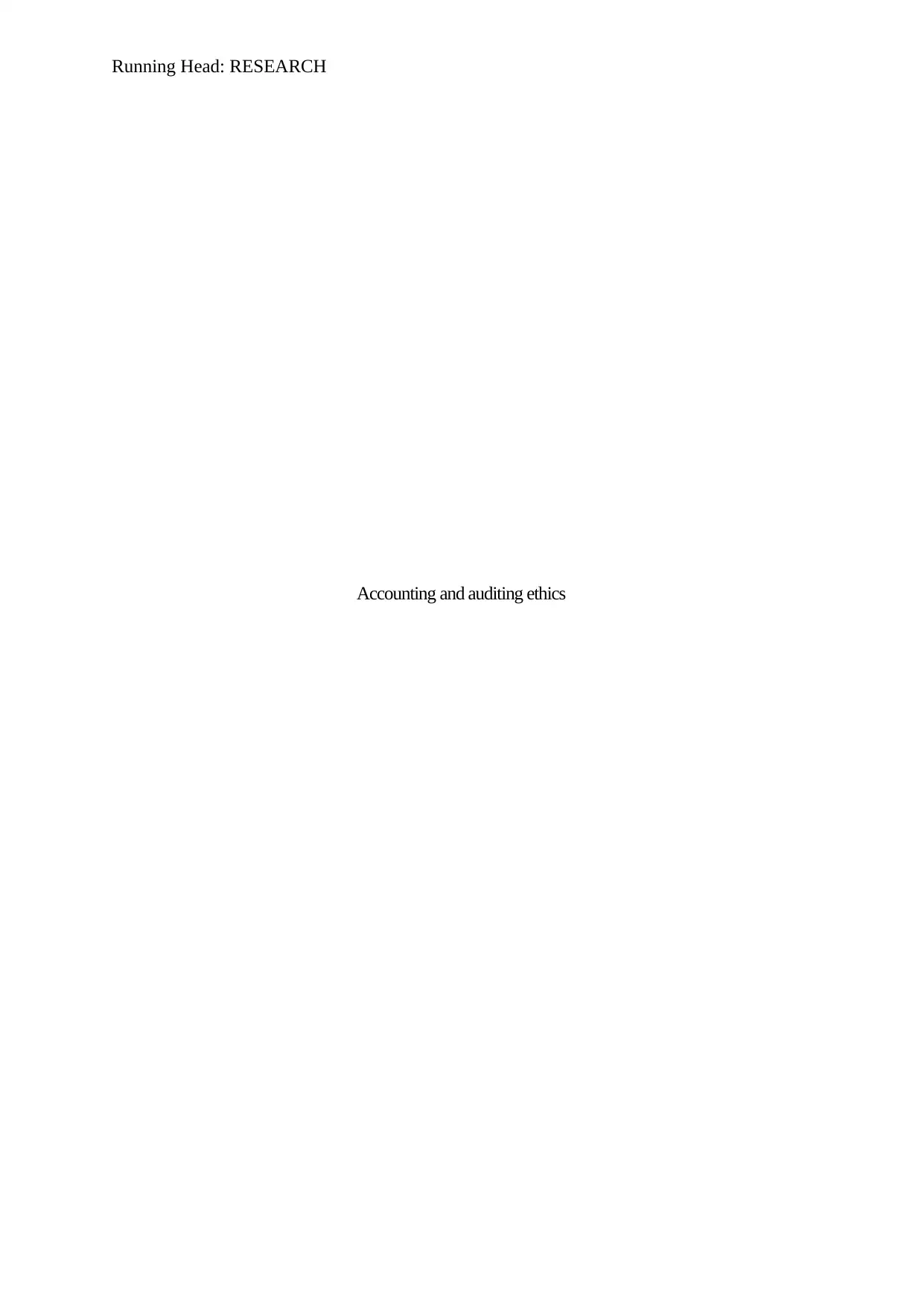
Running Head: RESEARCH
Accounting and auditing ethics
Accounting and auditing ethics
Paraphrase This Document
Need a fresh take? Get an instant paraphrase of this document with our AI Paraphraser
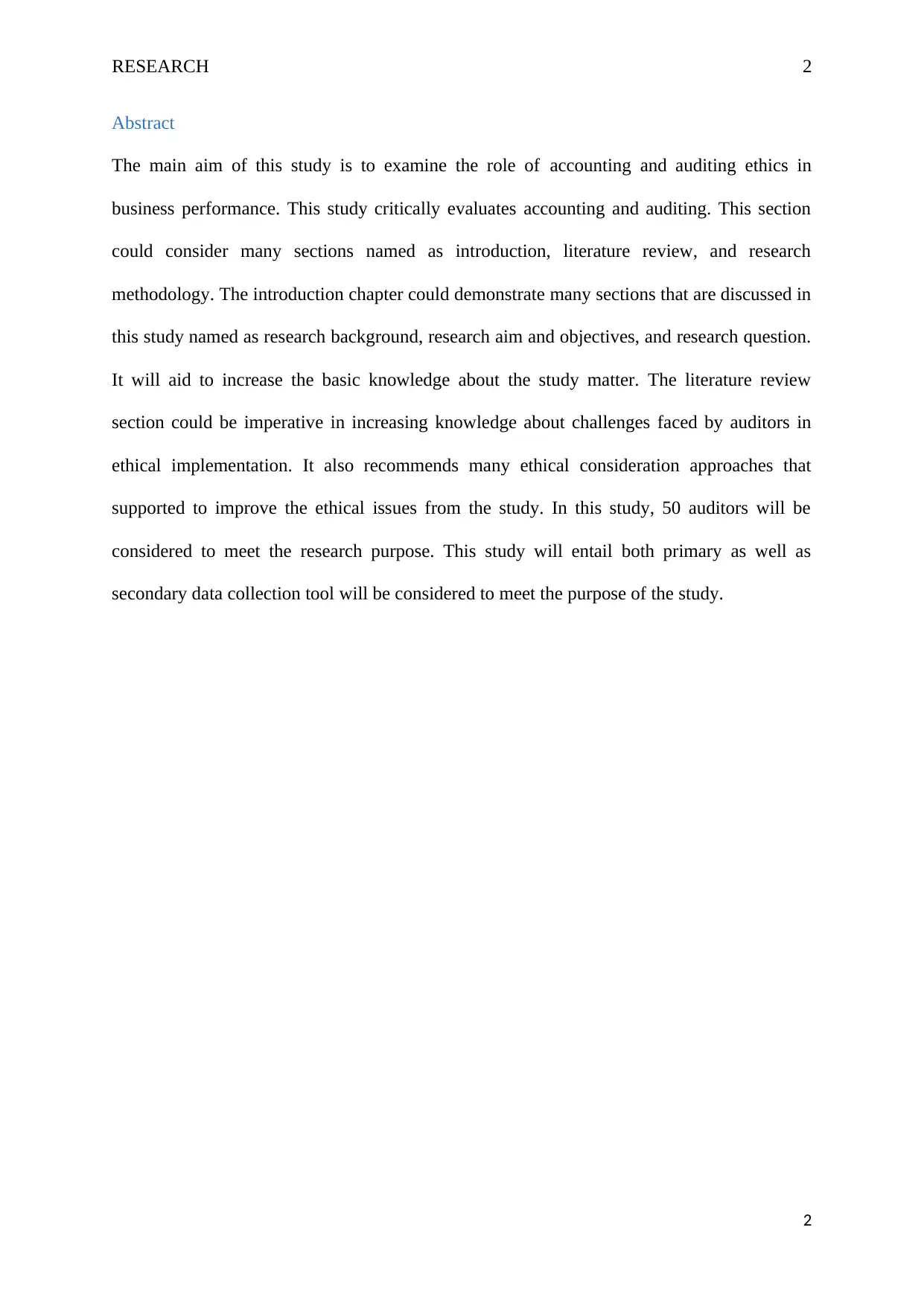
RESEARCH 2
Abstract
The main aim of this study is to examine the role of accounting and auditing ethics in
business performance. This study critically evaluates accounting and auditing. This section
could consider many sections named as introduction, literature review, and research
methodology. The introduction chapter could demonstrate many sections that are discussed in
this study named as research background, research aim and objectives, and research question.
It will aid to increase the basic knowledge about the study matter. The literature review
section could be imperative in increasing knowledge about challenges faced by auditors in
ethical implementation. It also recommends many ethical consideration approaches that
supported to improve the ethical issues from the study. In this study, 50 auditors will be
considered to meet the research purpose. This study will entail both primary as well as
secondary data collection tool will be considered to meet the purpose of the study.
2
Abstract
The main aim of this study is to examine the role of accounting and auditing ethics in
business performance. This study critically evaluates accounting and auditing. This section
could consider many sections named as introduction, literature review, and research
methodology. The introduction chapter could demonstrate many sections that are discussed in
this study named as research background, research aim and objectives, and research question.
It will aid to increase the basic knowledge about the study matter. The literature review
section could be imperative in increasing knowledge about challenges faced by auditors in
ethical implementation. It also recommends many ethical consideration approaches that
supported to improve the ethical issues from the study. In this study, 50 auditors will be
considered to meet the research purpose. This study will entail both primary as well as
secondary data collection tool will be considered to meet the purpose of the study.
2
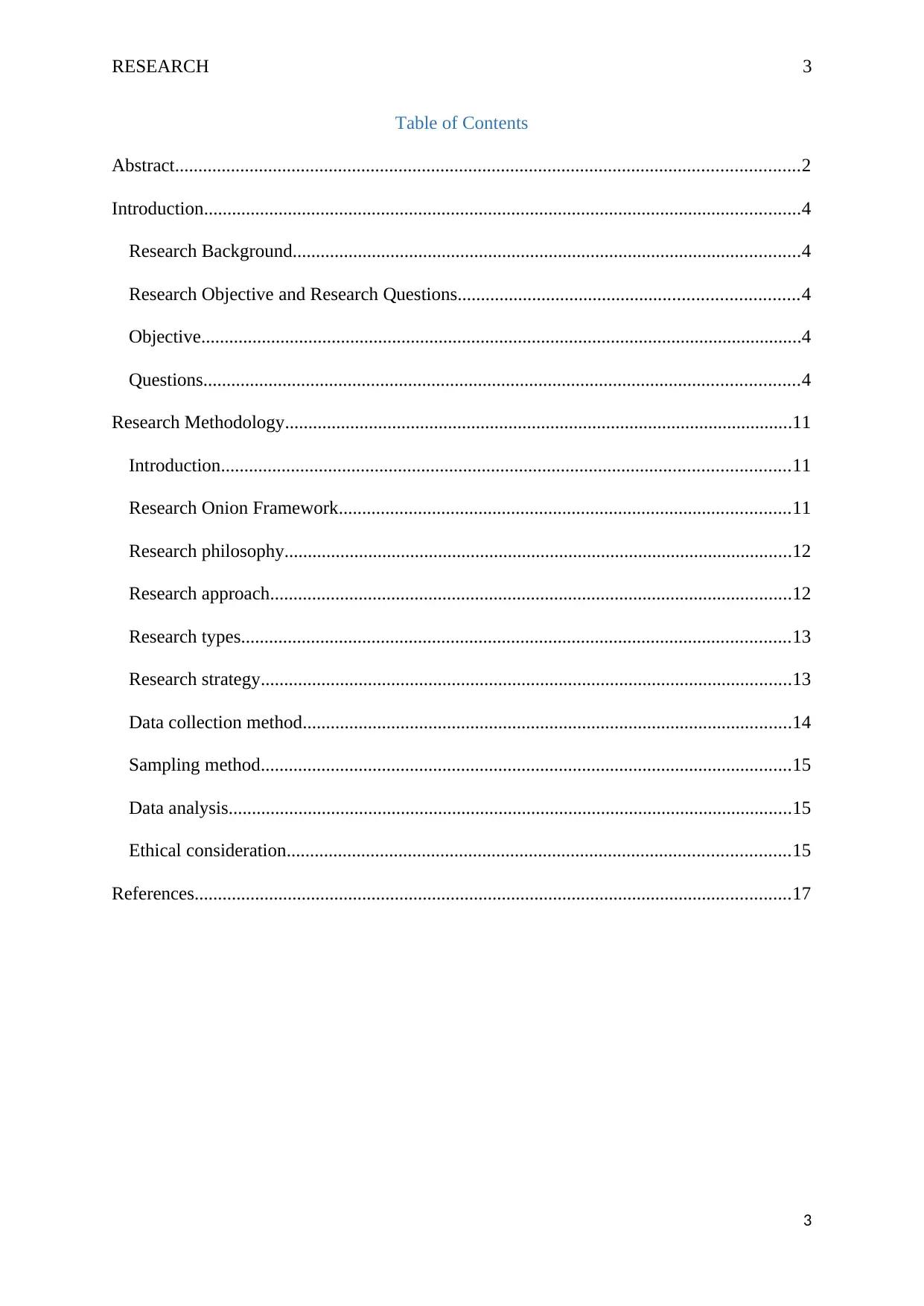
RESEARCH 3
Table of Contents
Abstract......................................................................................................................................2
Introduction................................................................................................................................4
Research Background.............................................................................................................4
Research Objective and Research Questions.........................................................................4
Objective.................................................................................................................................4
Questions................................................................................................................................4
Research Methodology.............................................................................................................11
Introduction..........................................................................................................................11
Research Onion Framework.................................................................................................11
Research philosophy.............................................................................................................12
Research approach................................................................................................................12
Research types......................................................................................................................13
Research strategy..................................................................................................................13
Data collection method.........................................................................................................14
Sampling method..................................................................................................................15
Data analysis.........................................................................................................................15
Ethical consideration............................................................................................................15
References................................................................................................................................17
3
Table of Contents
Abstract......................................................................................................................................2
Introduction................................................................................................................................4
Research Background.............................................................................................................4
Research Objective and Research Questions.........................................................................4
Objective.................................................................................................................................4
Questions................................................................................................................................4
Research Methodology.............................................................................................................11
Introduction..........................................................................................................................11
Research Onion Framework.................................................................................................11
Research philosophy.............................................................................................................12
Research approach................................................................................................................12
Research types......................................................................................................................13
Research strategy..................................................................................................................13
Data collection method.........................................................................................................14
Sampling method..................................................................................................................15
Data analysis.........................................................................................................................15
Ethical consideration............................................................................................................15
References................................................................................................................................17
3
⊘ This is a preview!⊘
Do you want full access?
Subscribe today to unlock all pages.

Trusted by 1+ million students worldwide
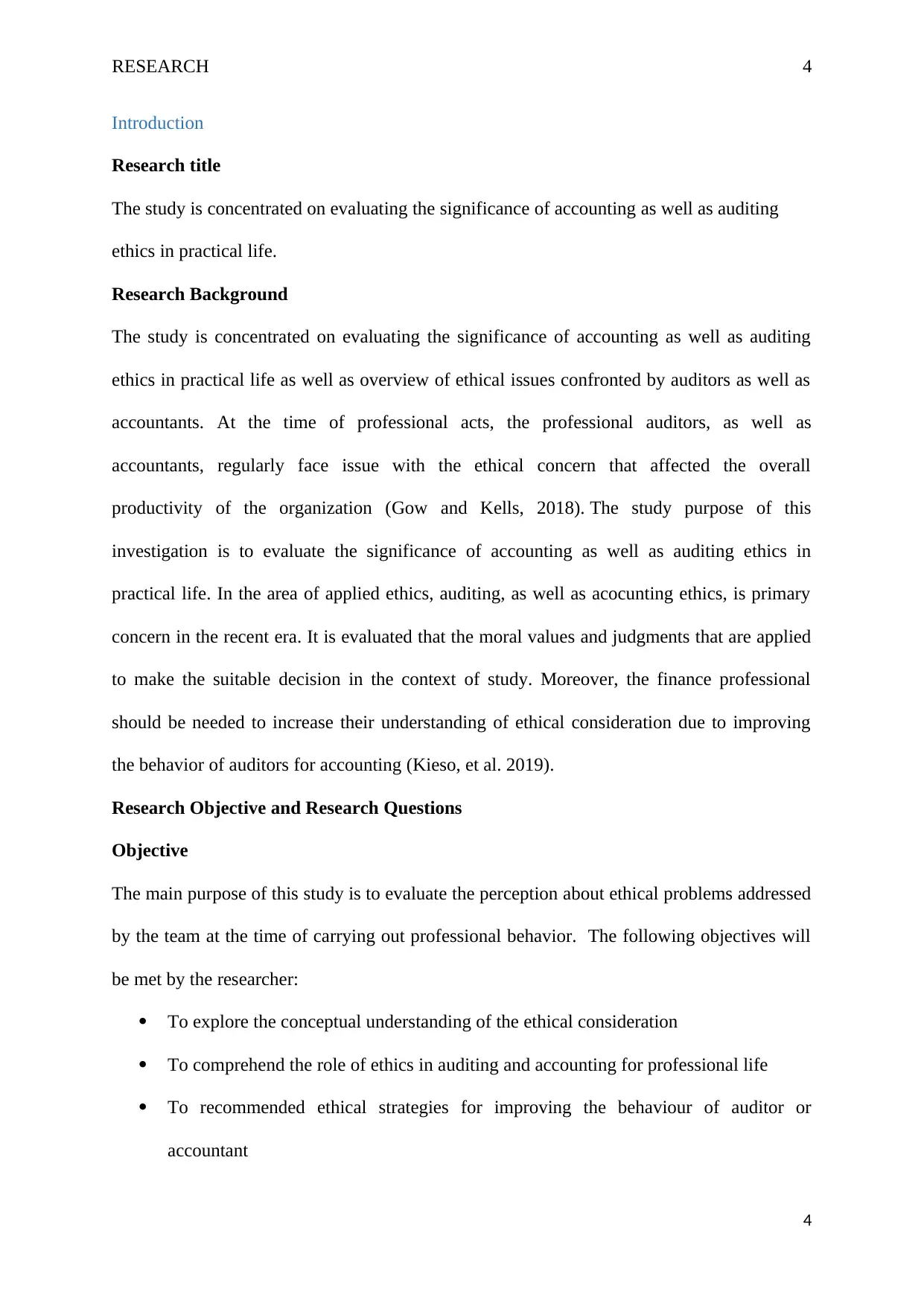
RESEARCH 4
Introduction
Research title
The study is concentrated on evaluating the significance of accounting as well as auditing
ethics in practical life.
Research Background
The study is concentrated on evaluating the significance of accounting as well as auditing
ethics in practical life as well as overview of ethical issues confronted by auditors as well as
accountants. At the time of professional acts, the professional auditors, as well as
accountants, regularly face issue with the ethical concern that affected the overall
productivity of the organization (Gow and Kells, 2018). The study purpose of this
investigation is to evaluate the significance of accounting as well as auditing ethics in
practical life. In the area of applied ethics, auditing, as well as acocunting ethics, is primary
concern in the recent era. It is evaluated that the moral values and judgments that are applied
to make the suitable decision in the context of study. Moreover, the finance professional
should be needed to increase their understanding of ethical consideration due to improving
the behavior of auditors for accounting (Kieso, et al. 2019).
Research Objective and Research Questions
Objective
The main purpose of this study is to evaluate the perception about ethical problems addressed
by the team at the time of carrying out professional behavior. The following objectives will
be met by the researcher:
To explore the conceptual understanding of the ethical consideration
To comprehend the role of ethics in auditing and accounting for professional life
To recommended ethical strategies for improving the behaviour of auditor or
accountant
4
Introduction
Research title
The study is concentrated on evaluating the significance of accounting as well as auditing
ethics in practical life.
Research Background
The study is concentrated on evaluating the significance of accounting as well as auditing
ethics in practical life as well as overview of ethical issues confronted by auditors as well as
accountants. At the time of professional acts, the professional auditors, as well as
accountants, regularly face issue with the ethical concern that affected the overall
productivity of the organization (Gow and Kells, 2018). The study purpose of this
investigation is to evaluate the significance of accounting as well as auditing ethics in
practical life. In the area of applied ethics, auditing, as well as acocunting ethics, is primary
concern in the recent era. It is evaluated that the moral values and judgments that are applied
to make the suitable decision in the context of study. Moreover, the finance professional
should be needed to increase their understanding of ethical consideration due to improving
the behavior of auditors for accounting (Kieso, et al. 2019).
Research Objective and Research Questions
Objective
The main purpose of this study is to evaluate the perception about ethical problems addressed
by the team at the time of carrying out professional behavior. The following objectives will
be met by the researcher:
To explore the conceptual understanding of the ethical consideration
To comprehend the role of ethics in auditing and accounting for professional life
To recommended ethical strategies for improving the behaviour of auditor or
accountant
4
Paraphrase This Document
Need a fresh take? Get an instant paraphrase of this document with our AI Paraphraser
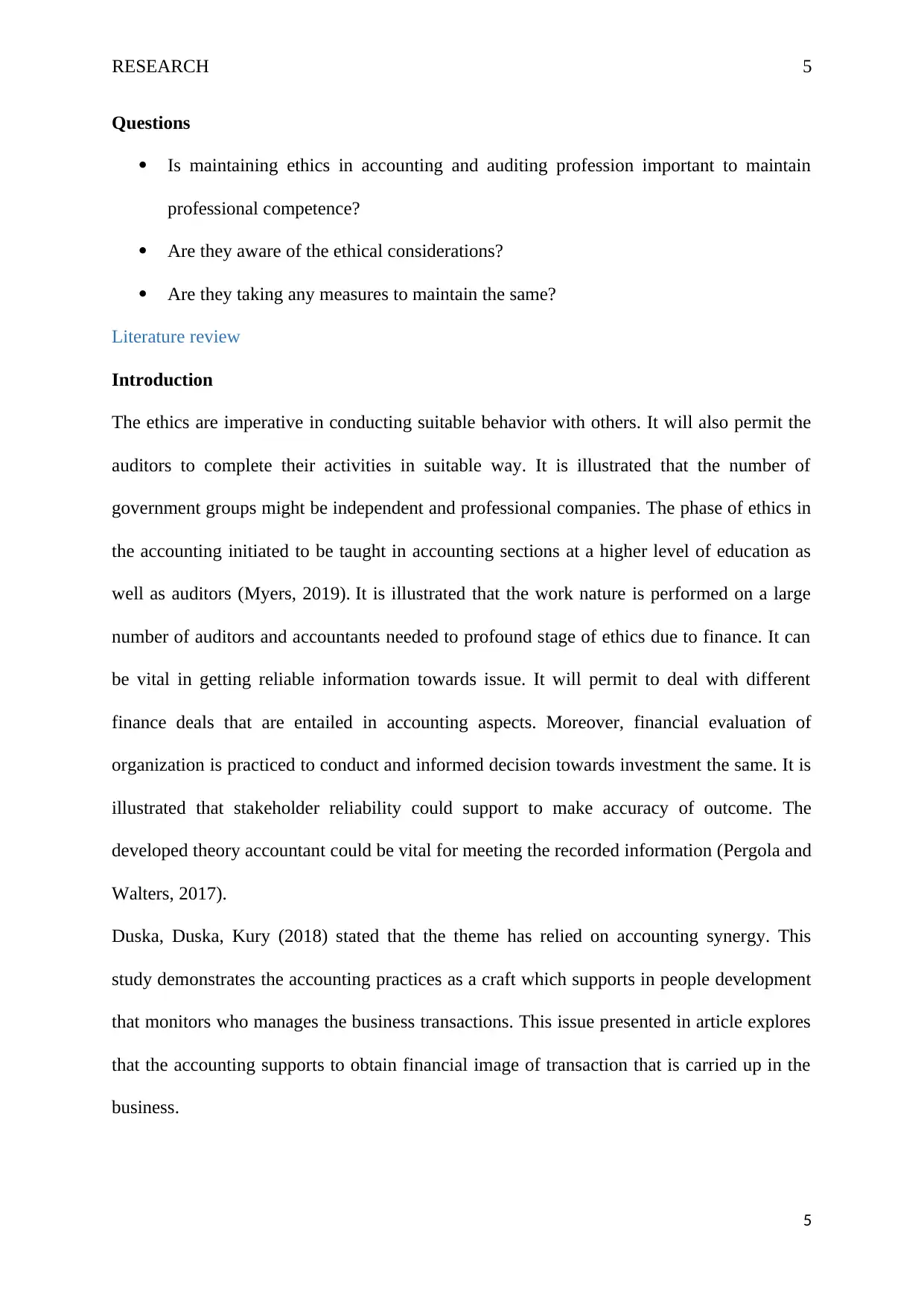
RESEARCH 5
Questions
Is maintaining ethics in accounting and auditing profession important to maintain
professional competence?
Are they aware of the ethical considerations?
Are they taking any measures to maintain the same?
Literature review
Introduction
The ethics are imperative in conducting suitable behavior with others. It will also permit the
auditors to complete their activities in suitable way. It is illustrated that the number of
government groups might be independent and professional companies. The phase of ethics in
the accounting initiated to be taught in accounting sections at a higher level of education as
well as auditors (Myers, 2019). It is illustrated that the work nature is performed on a large
number of auditors and accountants needed to profound stage of ethics due to finance. It can
be vital in getting reliable information towards issue. It will permit to deal with different
finance deals that are entailed in accounting aspects. Moreover, financial evaluation of
organization is practiced to conduct and informed decision towards investment the same. It is
illustrated that stakeholder reliability could support to make accuracy of outcome. The
developed theory accountant could be vital for meeting the recorded information (Pergola and
Walters, 2017).
Duska, Duska, Kury (2018) stated that the theme has relied on accounting synergy. This
study demonstrates the accounting practices as a craft which supports in people development
that monitors who manages the business transactions. This issue presented in article explores
that the accounting supports to obtain financial image of transaction that is carried up in the
business.
5
Questions
Is maintaining ethics in accounting and auditing profession important to maintain
professional competence?
Are they aware of the ethical considerations?
Are they taking any measures to maintain the same?
Literature review
Introduction
The ethics are imperative in conducting suitable behavior with others. It will also permit the
auditors to complete their activities in suitable way. It is illustrated that the number of
government groups might be independent and professional companies. The phase of ethics in
the accounting initiated to be taught in accounting sections at a higher level of education as
well as auditors (Myers, 2019). It is illustrated that the work nature is performed on a large
number of auditors and accountants needed to profound stage of ethics due to finance. It can
be vital in getting reliable information towards issue. It will permit to deal with different
finance deals that are entailed in accounting aspects. Moreover, financial evaluation of
organization is practiced to conduct and informed decision towards investment the same. It is
illustrated that stakeholder reliability could support to make accuracy of outcome. The
developed theory accountant could be vital for meeting the recorded information (Pergola and
Walters, 2017).
Duska, Duska, Kury (2018) stated that the theme has relied on accounting synergy. This
study demonstrates the accounting practices as a craft which supports in people development
that monitors who manages the business transactions. This issue presented in article explores
that the accounting supports to obtain financial image of transaction that is carried up in the
business.
5
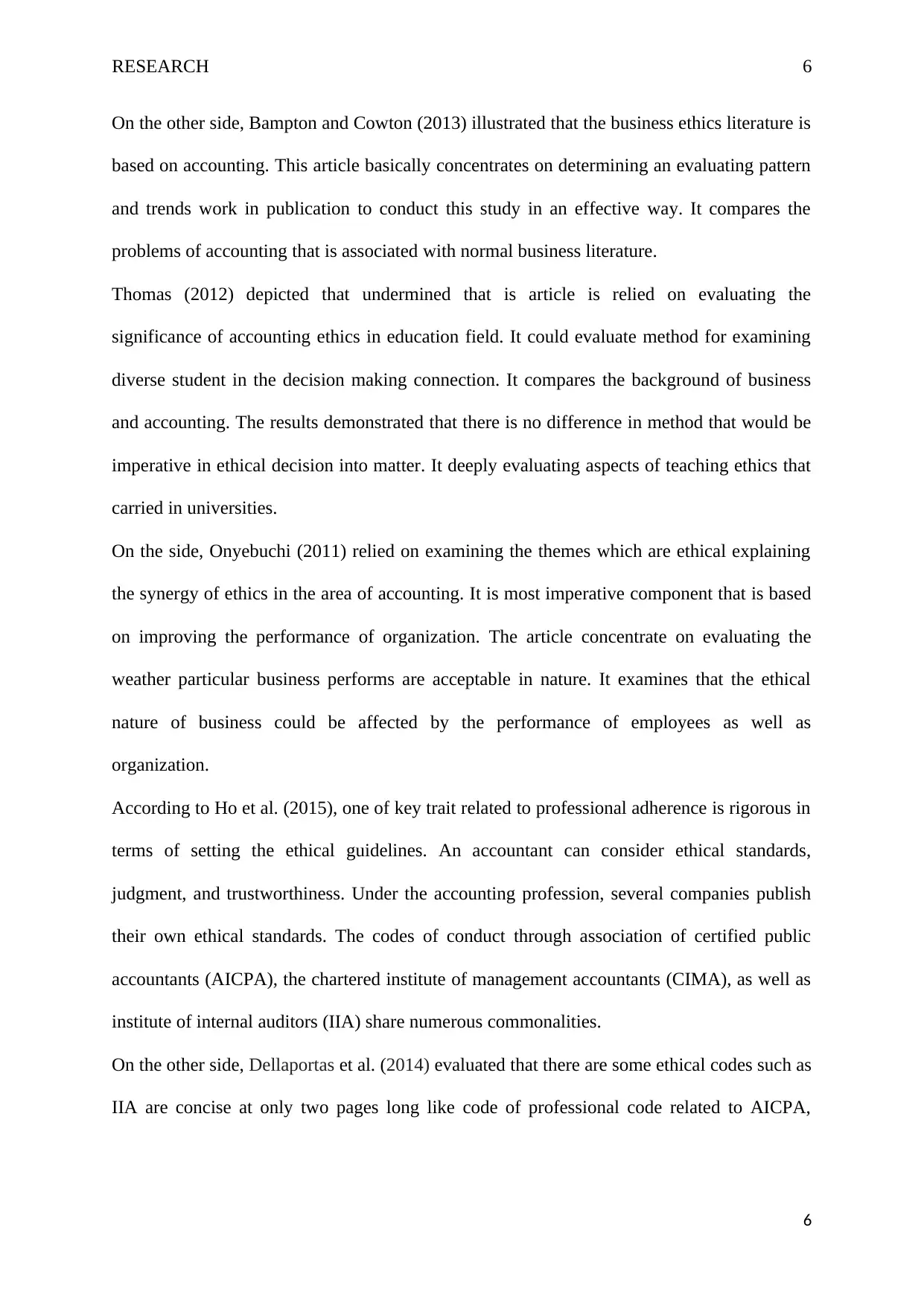
RESEARCH 6
On the other side, Bampton and Cowton (2013) illustrated that the business ethics literature is
based on accounting. This article basically concentrates on determining an evaluating pattern
and trends work in publication to conduct this study in an effective way. It compares the
problems of accounting that is associated with normal business literature.
Thomas (2012) depicted that undermined that is article is relied on evaluating the
significance of accounting ethics in education field. It could evaluate method for examining
diverse student in the decision making connection. It compares the background of business
and accounting. The results demonstrated that there is no difference in method that would be
imperative in ethical decision into matter. It deeply evaluating aspects of teaching ethics that
carried in universities.
On the side, Onyebuchi (2011) relied on examining the themes which are ethical explaining
the synergy of ethics in the area of accounting. It is most imperative component that is based
on improving the performance of organization. The article concentrate on evaluating the
weather particular business performs are acceptable in nature. It examines that the ethical
nature of business could be affected by the performance of employees as well as
organization.
According to Ho et al. (2015), one of key trait related to professional adherence is rigorous in
terms of setting the ethical guidelines. An accountant can consider ethical standards,
judgment, and trustworthiness. Under the accounting profession, several companies publish
their own ethical standards. The codes of conduct through association of certified public
accountants (AICPA), the chartered institute of management accountants (CIMA), as well as
institute of internal auditors (IIA) share numerous commonalities.
On the other side, Dellaportas et al. (2014) evaluated that there are some ethical codes such as
IIA are concise at only two pages long like code of professional code related to AICPA,
6
On the other side, Bampton and Cowton (2013) illustrated that the business ethics literature is
based on accounting. This article basically concentrates on determining an evaluating pattern
and trends work in publication to conduct this study in an effective way. It compares the
problems of accounting that is associated with normal business literature.
Thomas (2012) depicted that undermined that is article is relied on evaluating the
significance of accounting ethics in education field. It could evaluate method for examining
diverse student in the decision making connection. It compares the background of business
and accounting. The results demonstrated that there is no difference in method that would be
imperative in ethical decision into matter. It deeply evaluating aspects of teaching ethics that
carried in universities.
On the side, Onyebuchi (2011) relied on examining the themes which are ethical explaining
the synergy of ethics in the area of accounting. It is most imperative component that is based
on improving the performance of organization. The article concentrate on evaluating the
weather particular business performs are acceptable in nature. It examines that the ethical
nature of business could be affected by the performance of employees as well as
organization.
According to Ho et al. (2015), one of key trait related to professional adherence is rigorous in
terms of setting the ethical guidelines. An accountant can consider ethical standards,
judgment, and trustworthiness. Under the accounting profession, several companies publish
their own ethical standards. The codes of conduct through association of certified public
accountants (AICPA), the chartered institute of management accountants (CIMA), as well as
institute of internal auditors (IIA) share numerous commonalities.
On the other side, Dellaportas et al. (2014) evaluated that there are some ethical codes such as
IIA are concise at only two pages long like code of professional code related to AICPA,
6
⊘ This is a preview!⊘
Do you want full access?
Subscribe today to unlock all pages.

Trusted by 1+ million students worldwide
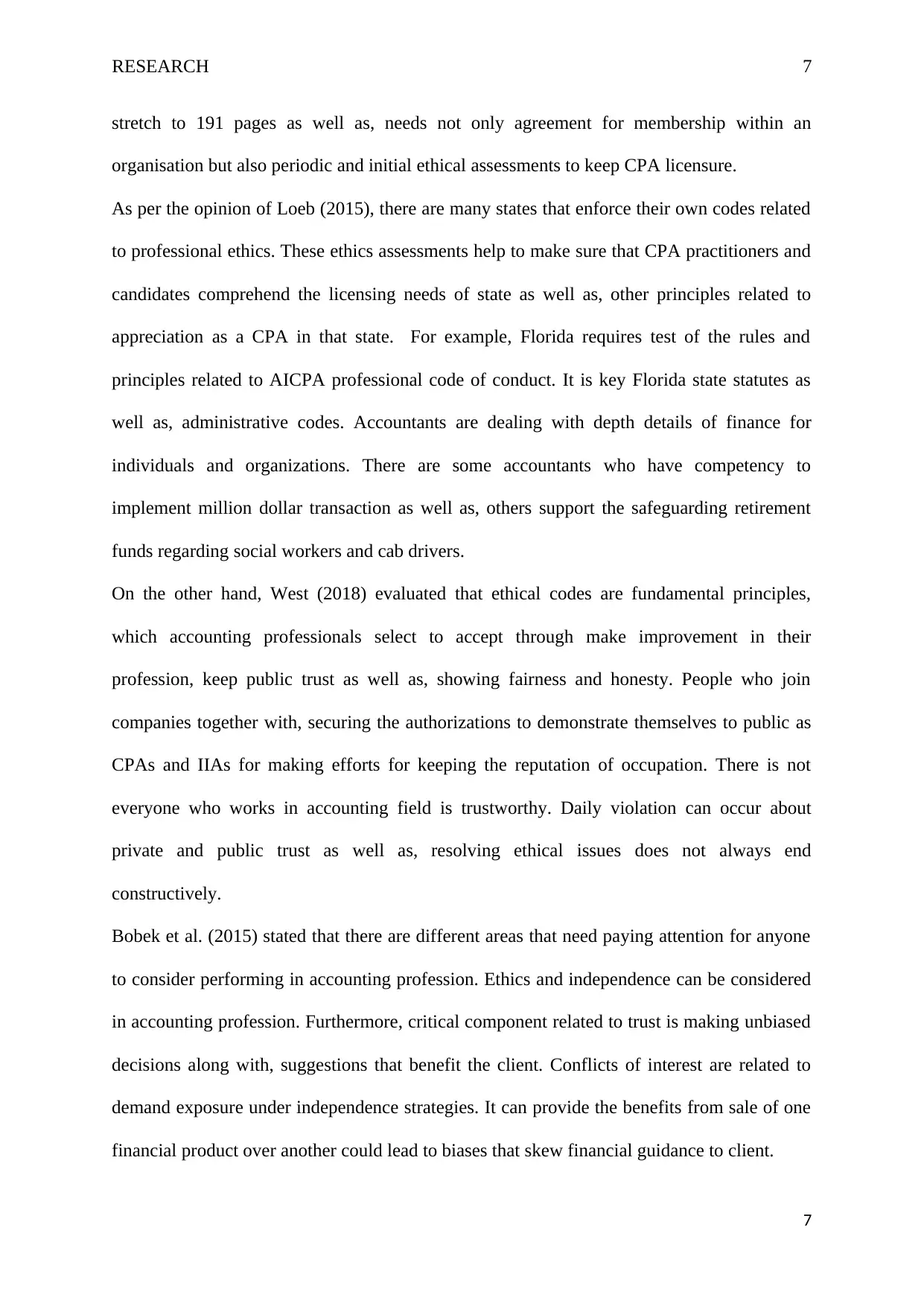
RESEARCH 7
stretch to 191 pages as well as, needs not only agreement for membership within an
organisation but also periodic and initial ethical assessments to keep CPA licensure.
As per the opinion of Loeb (2015), there are many states that enforce their own codes related
to professional ethics. These ethics assessments help to make sure that CPA practitioners and
candidates comprehend the licensing needs of state as well as, other principles related to
appreciation as a CPA in that state. For example, Florida requires test of the rules and
principles related to AICPA professional code of conduct. It is key Florida state statutes as
well as, administrative codes. Accountants are dealing with depth details of finance for
individuals and organizations. There are some accountants who have competency to
implement million dollar transaction as well as, others support the safeguarding retirement
funds regarding social workers and cab drivers.
On the other hand, West (2018) evaluated that ethical codes are fundamental principles,
which accounting professionals select to accept through make improvement in their
profession, keep public trust as well as, showing fairness and honesty. People who join
companies together with, securing the authorizations to demonstrate themselves to public as
CPAs and IIAs for making efforts for keeping the reputation of occupation. There is not
everyone who works in accounting field is trustworthy. Daily violation can occur about
private and public trust as well as, resolving ethical issues does not always end
constructively.
Bobek et al. (2015) stated that there are different areas that need paying attention for anyone
to consider performing in accounting profession. Ethics and independence can be considered
in accounting profession. Furthermore, critical component related to trust is making unbiased
decisions along with, suggestions that benefit the client. Conflicts of interest are related to
demand exposure under independence strategies. It can provide the benefits from sale of one
financial product over another could lead to biases that skew financial guidance to client.
7
stretch to 191 pages as well as, needs not only agreement for membership within an
organisation but also periodic and initial ethical assessments to keep CPA licensure.
As per the opinion of Loeb (2015), there are many states that enforce their own codes related
to professional ethics. These ethics assessments help to make sure that CPA practitioners and
candidates comprehend the licensing needs of state as well as, other principles related to
appreciation as a CPA in that state. For example, Florida requires test of the rules and
principles related to AICPA professional code of conduct. It is key Florida state statutes as
well as, administrative codes. Accountants are dealing with depth details of finance for
individuals and organizations. There are some accountants who have competency to
implement million dollar transaction as well as, others support the safeguarding retirement
funds regarding social workers and cab drivers.
On the other hand, West (2018) evaluated that ethical codes are fundamental principles,
which accounting professionals select to accept through make improvement in their
profession, keep public trust as well as, showing fairness and honesty. People who join
companies together with, securing the authorizations to demonstrate themselves to public as
CPAs and IIAs for making efforts for keeping the reputation of occupation. There is not
everyone who works in accounting field is trustworthy. Daily violation can occur about
private and public trust as well as, resolving ethical issues does not always end
constructively.
Bobek et al. (2015) stated that there are different areas that need paying attention for anyone
to consider performing in accounting profession. Ethics and independence can be considered
in accounting profession. Furthermore, critical component related to trust is making unbiased
decisions along with, suggestions that benefit the client. Conflicts of interest are related to
demand exposure under independence strategies. It can provide the benefits from sale of one
financial product over another could lead to biases that skew financial guidance to client.
7
Paraphrase This Document
Need a fresh take? Get an instant paraphrase of this document with our AI Paraphraser
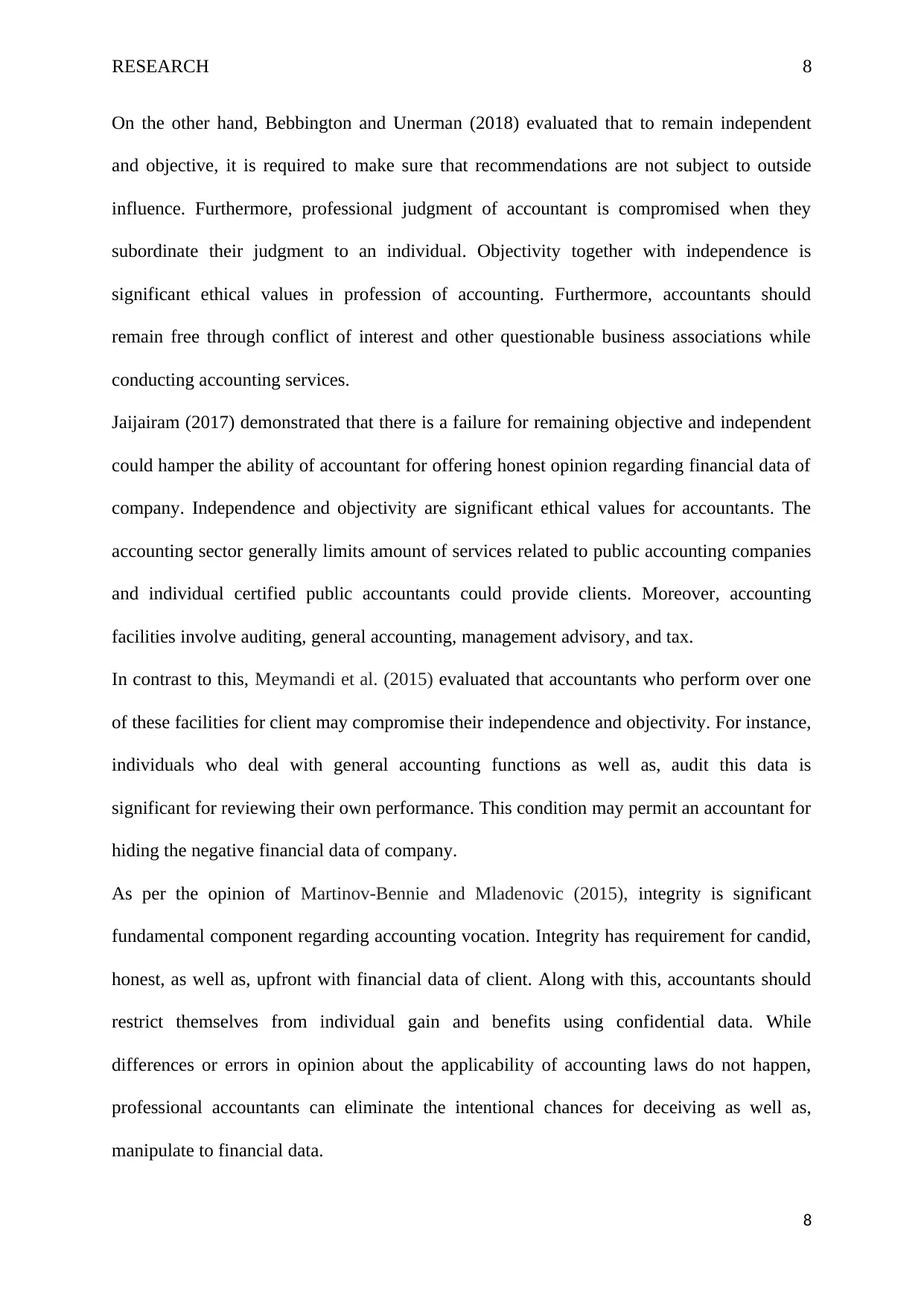
RESEARCH 8
On the other hand, Bebbington and Unerman (2018) evaluated that to remain independent
and objective, it is required to make sure that recommendations are not subject to outside
influence. Furthermore, professional judgment of accountant is compromised when they
subordinate their judgment to an individual. Objectivity together with independence is
significant ethical values in profession of accounting. Furthermore, accountants should
remain free through conflict of interest and other questionable business associations while
conducting accounting services.
Jaijairam (2017) demonstrated that there is a failure for remaining objective and independent
could hamper the ability of accountant for offering honest opinion regarding financial data of
company. Independence and objectivity are significant ethical values for accountants. The
accounting sector generally limits amount of services related to public accounting companies
and individual certified public accountants could provide clients. Moreover, accounting
facilities involve auditing, general accounting, management advisory, and tax.
In contrast to this, Meymandi et al. (2015) evaluated that accountants who perform over one
of these facilities for client may compromise their independence and objectivity. For instance,
individuals who deal with general accounting functions as well as, audit this data is
significant for reviewing their own performance. This condition may permit an accountant for
hiding the negative financial data of company.
As per the opinion of Martinov-Bennie and Mladenovic (2015), integrity is significant
fundamental component regarding accounting vocation. Integrity has requirement for candid,
honest, as well as, upfront with financial data of client. Along with this, accountants should
restrict themselves from individual gain and benefits using confidential data. While
differences or errors in opinion about the applicability of accounting laws do not happen,
professional accountants can eliminate the intentional chances for deceiving as well as,
manipulate to financial data.
8
On the other hand, Bebbington and Unerman (2018) evaluated that to remain independent
and objective, it is required to make sure that recommendations are not subject to outside
influence. Furthermore, professional judgment of accountant is compromised when they
subordinate their judgment to an individual. Objectivity together with independence is
significant ethical values in profession of accounting. Furthermore, accountants should
remain free through conflict of interest and other questionable business associations while
conducting accounting services.
Jaijairam (2017) demonstrated that there is a failure for remaining objective and independent
could hamper the ability of accountant for offering honest opinion regarding financial data of
company. Independence and objectivity are significant ethical values for accountants. The
accounting sector generally limits amount of services related to public accounting companies
and individual certified public accountants could provide clients. Moreover, accounting
facilities involve auditing, general accounting, management advisory, and tax.
In contrast to this, Meymandi et al. (2015) evaluated that accountants who perform over one
of these facilities for client may compromise their independence and objectivity. For instance,
individuals who deal with general accounting functions as well as, audit this data is
significant for reviewing their own performance. This condition may permit an accountant for
hiding the negative financial data of company.
As per the opinion of Martinov-Bennie and Mladenovic (2015), integrity is significant
fundamental component regarding accounting vocation. Integrity has requirement for candid,
honest, as well as, upfront with financial data of client. Along with this, accountants should
restrict themselves from individual gain and benefits using confidential data. While
differences or errors in opinion about the applicability of accounting laws do not happen,
professional accountants can eliminate the intentional chances for deceiving as well as,
manipulate to financial data.
8
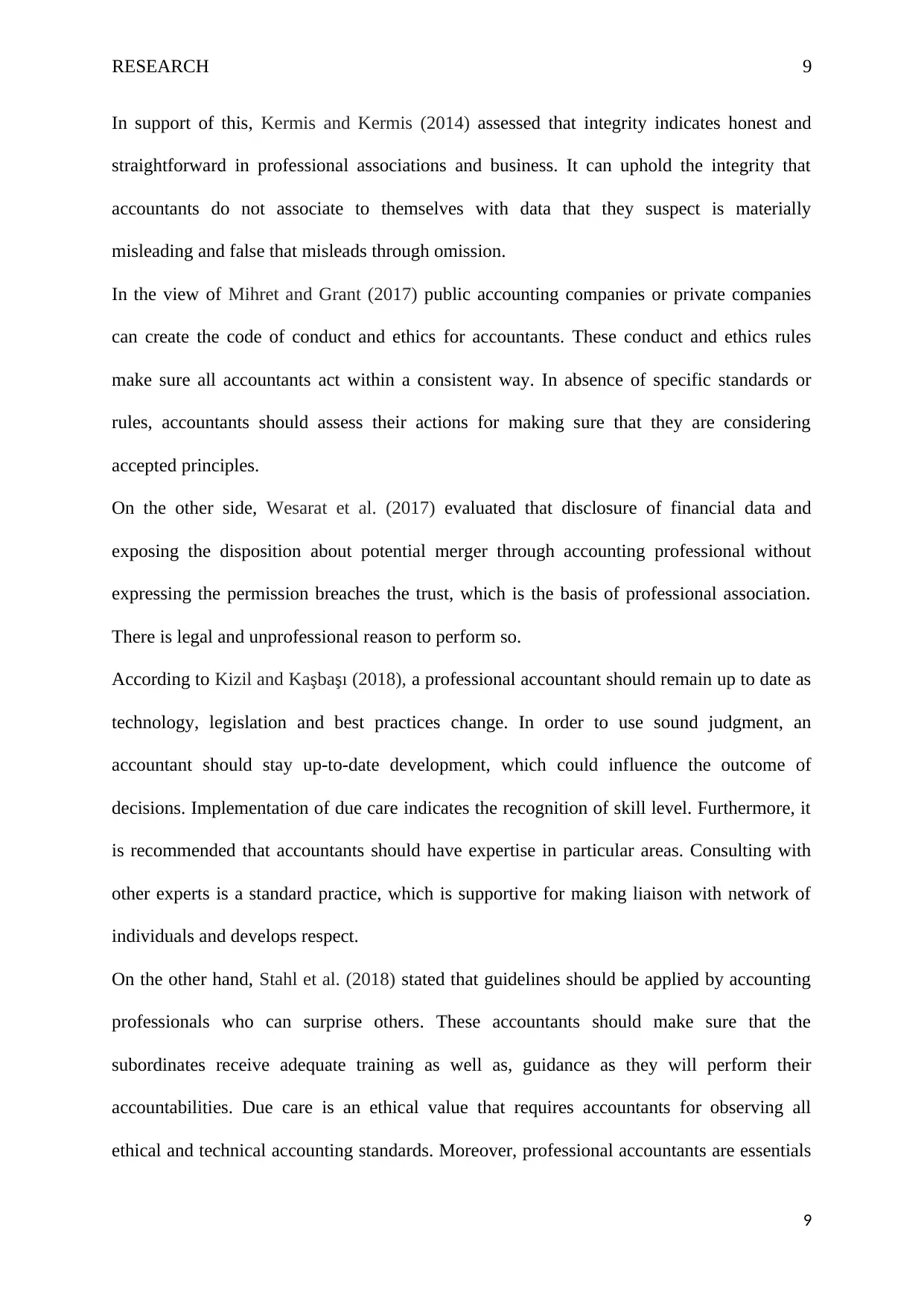
RESEARCH 9
In support of this, Kermis and Kermis (2014) assessed that integrity indicates honest and
straightforward in professional associations and business. It can uphold the integrity that
accountants do not associate to themselves with data that they suspect is materially
misleading and false that misleads through omission.
In the view of Mihret and Grant (2017) public accounting companies or private companies
can create the code of conduct and ethics for accountants. These conduct and ethics rules
make sure all accountants act within a consistent way. In absence of specific standards or
rules, accountants should assess their actions for making sure that they are considering
accepted principles.
On the other side, Wesarat et al. (2017) evaluated that disclosure of financial data and
exposing the disposition about potential merger through accounting professional without
expressing the permission breaches the trust, which is the basis of professional association.
There is legal and unprofessional reason to perform so.
According to Kizil and Kaşbaşı (2018), a professional accountant should remain up to date as
technology, legislation and best practices change. In order to use sound judgment, an
accountant should stay up-to-date development, which could influence the outcome of
decisions. Implementation of due care indicates the recognition of skill level. Furthermore, it
is recommended that accountants should have expertise in particular areas. Consulting with
other experts is a standard practice, which is supportive for making liaison with network of
individuals and develops respect.
On the other hand, Stahl et al. (2018) stated that guidelines should be applied by accounting
professionals who can surprise others. These accountants should make sure that the
subordinates receive adequate training as well as, guidance as they will perform their
accountabilities. Due care is an ethical value that requires accountants for observing all
ethical and technical accounting standards. Moreover, professional accountants are essentials
9
In support of this, Kermis and Kermis (2014) assessed that integrity indicates honest and
straightforward in professional associations and business. It can uphold the integrity that
accountants do not associate to themselves with data that they suspect is materially
misleading and false that misleads through omission.
In the view of Mihret and Grant (2017) public accounting companies or private companies
can create the code of conduct and ethics for accountants. These conduct and ethics rules
make sure all accountants act within a consistent way. In absence of specific standards or
rules, accountants should assess their actions for making sure that they are considering
accepted principles.
On the other side, Wesarat et al. (2017) evaluated that disclosure of financial data and
exposing the disposition about potential merger through accounting professional without
expressing the permission breaches the trust, which is the basis of professional association.
There is legal and unprofessional reason to perform so.
According to Kizil and Kaşbaşı (2018), a professional accountant should remain up to date as
technology, legislation and best practices change. In order to use sound judgment, an
accountant should stay up-to-date development, which could influence the outcome of
decisions. Implementation of due care indicates the recognition of skill level. Furthermore, it
is recommended that accountants should have expertise in particular areas. Consulting with
other experts is a standard practice, which is supportive for making liaison with network of
individuals and develops respect.
On the other hand, Stahl et al. (2018) stated that guidelines should be applied by accounting
professionals who can surprise others. These accountants should make sure that the
subordinates receive adequate training as well as, guidance as they will perform their
accountabilities. Due care is an ethical value that requires accountants for observing all
ethical and technical accounting standards. Moreover, professional accountants are essentials
9
⊘ This is a preview!⊘
Do you want full access?
Subscribe today to unlock all pages.

Trusted by 1+ million students worldwide
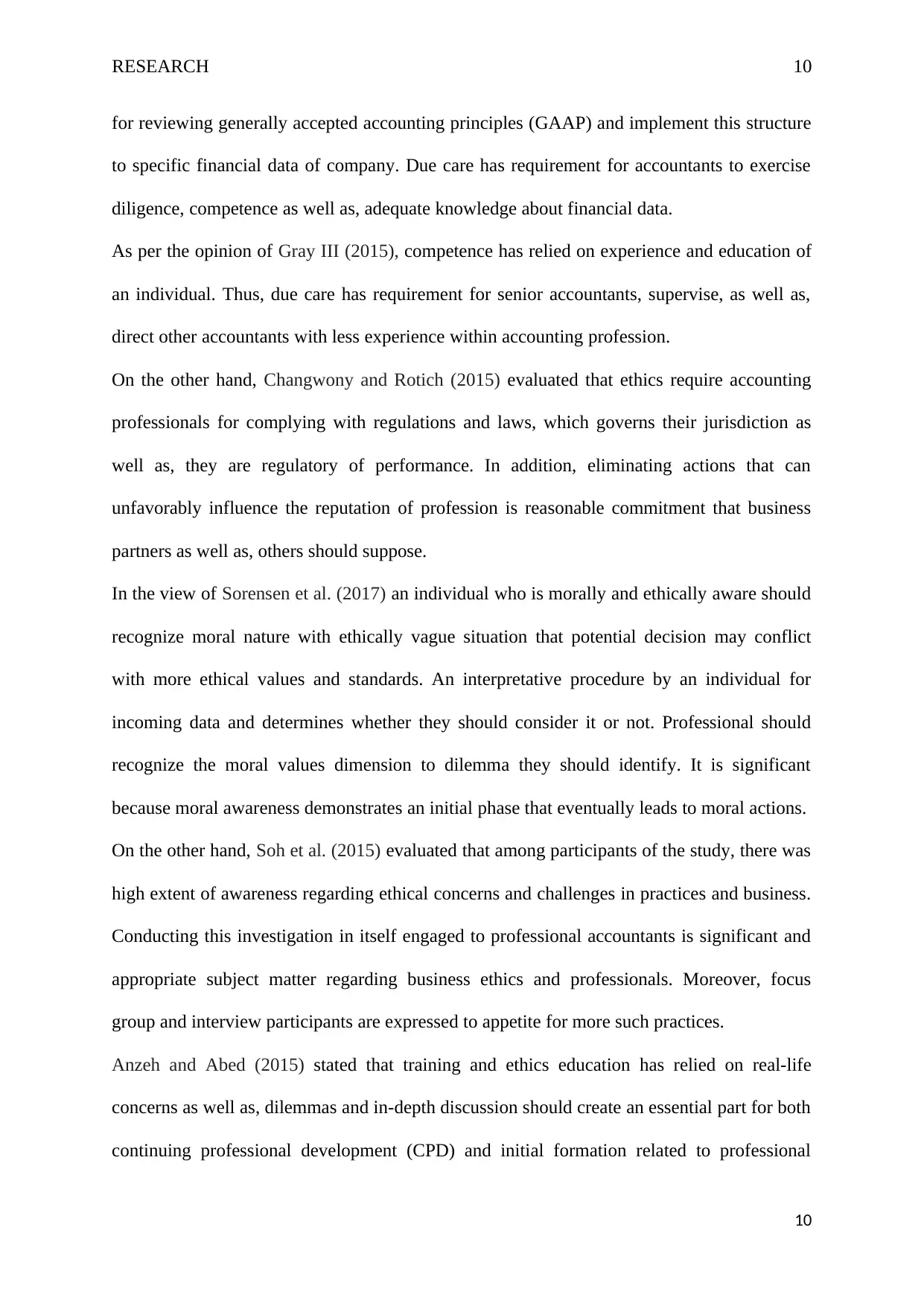
RESEARCH 10
for reviewing generally accepted accounting principles (GAAP) and implement this structure
to specific financial data of company. Due care has requirement for accountants to exercise
diligence, competence as well as, adequate knowledge about financial data.
As per the opinion of Gray III (2015), competence has relied on experience and education of
an individual. Thus, due care has requirement for senior accountants, supervise, as well as,
direct other accountants with less experience within accounting profession.
On the other hand, Changwony and Rotich (2015) evaluated that ethics require accounting
professionals for complying with regulations and laws, which governs their jurisdiction as
well as, they are regulatory of performance. In addition, eliminating actions that can
unfavorably influence the reputation of profession is reasonable commitment that business
partners as well as, others should suppose.
In the view of Sorensen et al. (2017) an individual who is morally and ethically aware should
recognize moral nature with ethically vague situation that potential decision may conflict
with more ethical values and standards. An interpretative procedure by an individual for
incoming data and determines whether they should consider it or not. Professional should
recognize the moral values dimension to dilemma they should identify. It is significant
because moral awareness demonstrates an initial phase that eventually leads to moral actions.
On the other hand, Soh et al. (2015) evaluated that among participants of the study, there was
high extent of awareness regarding ethical concerns and challenges in practices and business.
Conducting this investigation in itself engaged to professional accountants is significant and
appropriate subject matter regarding business ethics and professionals. Moreover, focus
group and interview participants are expressed to appetite for more such practices.
Anzeh and Abed (2015) stated that training and ethics education has relied on real-life
concerns as well as, dilemmas and in-depth discussion should create an essential part for both
continuing professional development (CPD) and initial formation related to professional
10
for reviewing generally accepted accounting principles (GAAP) and implement this structure
to specific financial data of company. Due care has requirement for accountants to exercise
diligence, competence as well as, adequate knowledge about financial data.
As per the opinion of Gray III (2015), competence has relied on experience and education of
an individual. Thus, due care has requirement for senior accountants, supervise, as well as,
direct other accountants with less experience within accounting profession.
On the other hand, Changwony and Rotich (2015) evaluated that ethics require accounting
professionals for complying with regulations and laws, which governs their jurisdiction as
well as, they are regulatory of performance. In addition, eliminating actions that can
unfavorably influence the reputation of profession is reasonable commitment that business
partners as well as, others should suppose.
In the view of Sorensen et al. (2017) an individual who is morally and ethically aware should
recognize moral nature with ethically vague situation that potential decision may conflict
with more ethical values and standards. An interpretative procedure by an individual for
incoming data and determines whether they should consider it or not. Professional should
recognize the moral values dimension to dilemma they should identify. It is significant
because moral awareness demonstrates an initial phase that eventually leads to moral actions.
On the other hand, Soh et al. (2015) evaluated that among participants of the study, there was
high extent of awareness regarding ethical concerns and challenges in practices and business.
Conducting this investigation in itself engaged to professional accountants is significant and
appropriate subject matter regarding business ethics and professionals. Moreover, focus
group and interview participants are expressed to appetite for more such practices.
Anzeh and Abed (2015) stated that training and ethics education has relied on real-life
concerns as well as, dilemmas and in-depth discussion should create an essential part for both
continuing professional development (CPD) and initial formation related to professional
10
Paraphrase This Document
Need a fresh take? Get an instant paraphrase of this document with our AI Paraphraser
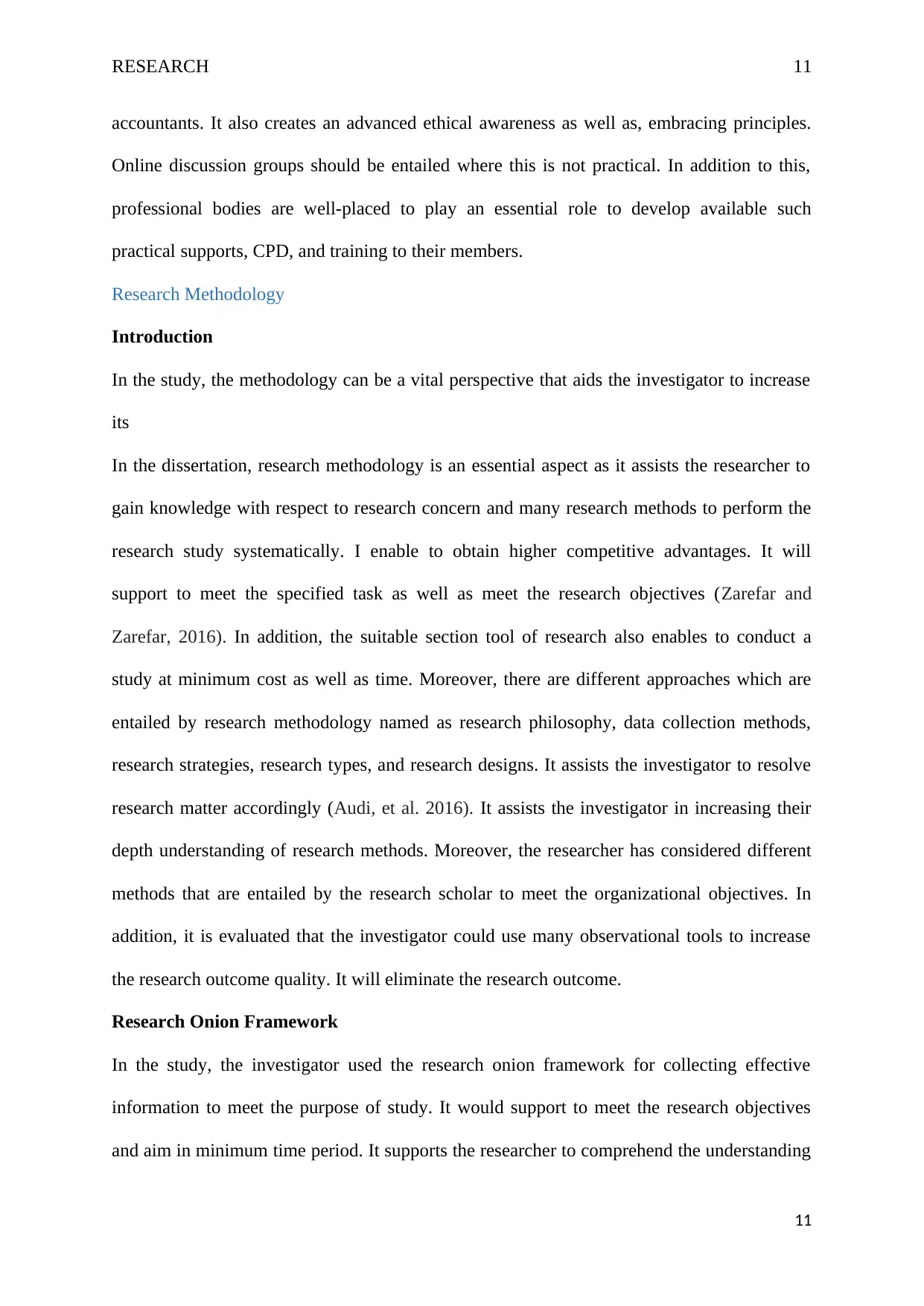
RESEARCH 11
accountants. It also creates an advanced ethical awareness as well as, embracing principles.
Online discussion groups should be entailed where this is not practical. In addition to this,
professional bodies are well-placed to play an essential role to develop available such
practical supports, CPD, and training to their members.
Research Methodology
Introduction
In the study, the methodology can be a vital perspective that aids the investigator to increase
its
In the dissertation, research methodology is an essential aspect as it assists the researcher to
gain knowledge with respect to research concern and many research methods to perform the
research study systematically. I enable to obtain higher competitive advantages. It will
support to meet the specified task as well as meet the research objectives (Zarefar and
Zarefar, 2016). In addition, the suitable section tool of research also enables to conduct a
study at minimum cost as well as time. Moreover, there are different approaches which are
entailed by research methodology named as research philosophy, data collection methods,
research strategies, research types, and research designs. It assists the investigator to resolve
research matter accordingly (Audi, et al. 2016). It assists the investigator in increasing their
depth understanding of research methods. Moreover, the researcher has considered different
methods that are entailed by the research scholar to meet the organizational objectives. In
addition, it is evaluated that the investigator could use many observational tools to increase
the research outcome quality. It will eliminate the research outcome.
Research Onion Framework
In the study, the investigator used the research onion framework for collecting effective
information to meet the purpose of study. It would support to meet the research objectives
and aim in minimum time period. It supports the researcher to comprehend the understanding
11
accountants. It also creates an advanced ethical awareness as well as, embracing principles.
Online discussion groups should be entailed where this is not practical. In addition to this,
professional bodies are well-placed to play an essential role to develop available such
practical supports, CPD, and training to their members.
Research Methodology
Introduction
In the study, the methodology can be a vital perspective that aids the investigator to increase
its
In the dissertation, research methodology is an essential aspect as it assists the researcher to
gain knowledge with respect to research concern and many research methods to perform the
research study systematically. I enable to obtain higher competitive advantages. It will
support to meet the specified task as well as meet the research objectives (Zarefar and
Zarefar, 2016). In addition, the suitable section tool of research also enables to conduct a
study at minimum cost as well as time. Moreover, there are different approaches which are
entailed by research methodology named as research philosophy, data collection methods,
research strategies, research types, and research designs. It assists the investigator to resolve
research matter accordingly (Audi, et al. 2016). It assists the investigator in increasing their
depth understanding of research methods. Moreover, the researcher has considered different
methods that are entailed by the research scholar to meet the organizational objectives. In
addition, it is evaluated that the investigator could use many observational tools to increase
the research outcome quality. It will eliminate the research outcome.
Research Onion Framework
In the study, the investigator used the research onion framework for collecting effective
information to meet the purpose of study. It would support to meet the research objectives
and aim in minimum time period. It supports the researcher to comprehend the understanding
11
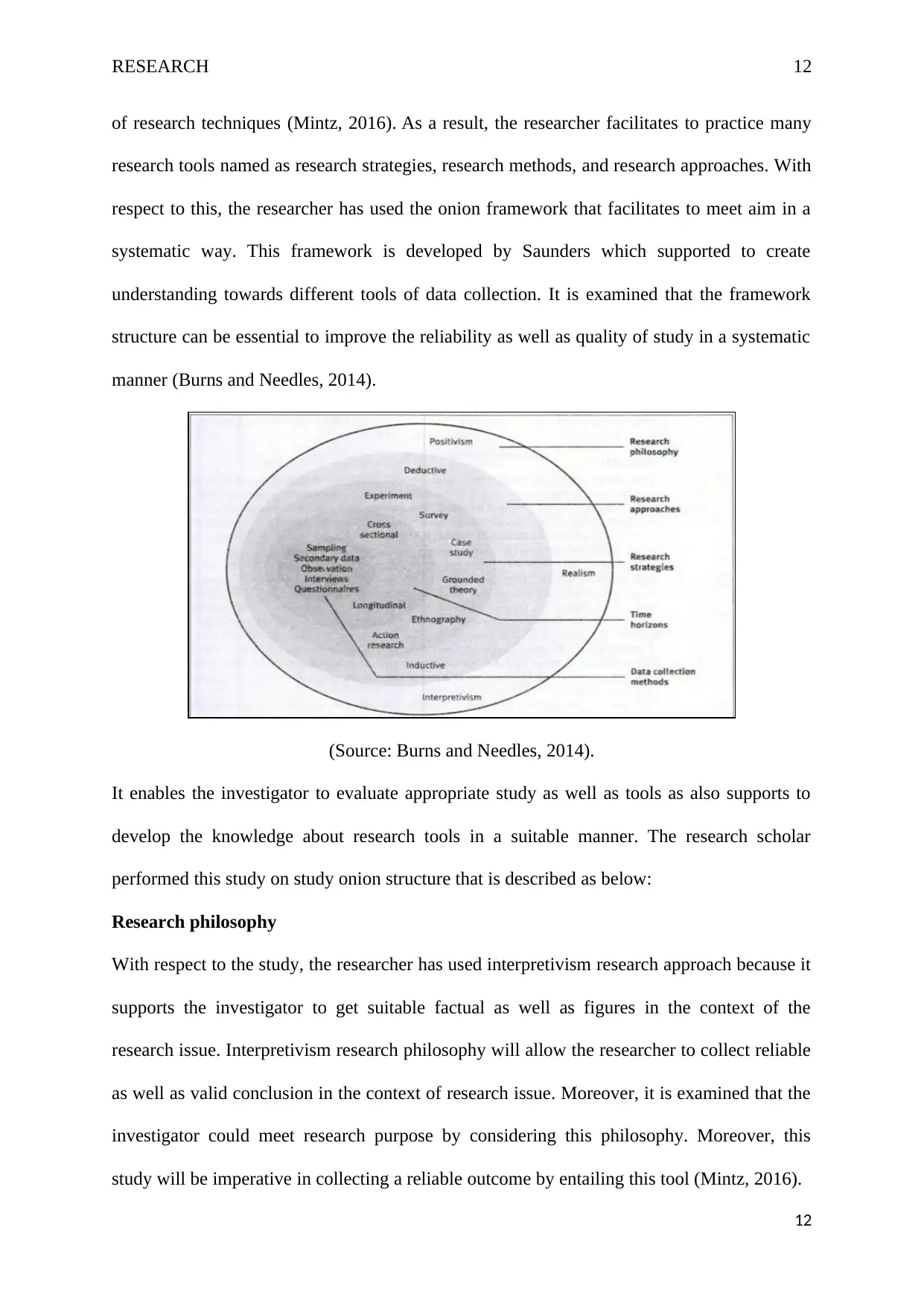
RESEARCH 12
of research techniques (Mintz, 2016). As a result, the researcher facilitates to practice many
research tools named as research strategies, research methods, and research approaches. With
respect to this, the researcher has used the onion framework that facilitates to meet aim in a
systematic way. This framework is developed by Saunders which supported to create
understanding towards different tools of data collection. It is examined that the framework
structure can be essential to improve the reliability as well as quality of study in a systematic
manner (Burns and Needles, 2014).
(Source: Burns and Needles, 2014).
It enables the investigator to evaluate appropriate study as well as tools as also supports to
develop the knowledge about research tools in a suitable manner. The research scholar
performed this study on study onion structure that is described as below:
Research philosophy
With respect to the study, the researcher has used interpretivism research approach because it
supports the investigator to get suitable factual as well as figures in the context of the
research issue. Interpretivism research philosophy will allow the researcher to collect reliable
as well as valid conclusion in the context of research issue. Moreover, it is examined that the
investigator could meet research purpose by considering this philosophy. Moreover, this
study will be imperative in collecting a reliable outcome by entailing this tool (Mintz, 2016).
12
of research techniques (Mintz, 2016). As a result, the researcher facilitates to practice many
research tools named as research strategies, research methods, and research approaches. With
respect to this, the researcher has used the onion framework that facilitates to meet aim in a
systematic way. This framework is developed by Saunders which supported to create
understanding towards different tools of data collection. It is examined that the framework
structure can be essential to improve the reliability as well as quality of study in a systematic
manner (Burns and Needles, 2014).
(Source: Burns and Needles, 2014).
It enables the investigator to evaluate appropriate study as well as tools as also supports to
develop the knowledge about research tools in a suitable manner. The research scholar
performed this study on study onion structure that is described as below:
Research philosophy
With respect to the study, the researcher has used interpretivism research approach because it
supports the investigator to get suitable factual as well as figures in the context of the
research issue. Interpretivism research philosophy will allow the researcher to collect reliable
as well as valid conclusion in the context of research issue. Moreover, it is examined that the
investigator could meet research purpose by considering this philosophy. Moreover, this
study will be imperative in collecting a reliable outcome by entailing this tool (Mintz, 2016).
12
⊘ This is a preview!⊘
Do you want full access?
Subscribe today to unlock all pages.

Trusted by 1+ million students worldwide
1 out of 20
Related Documents
Your All-in-One AI-Powered Toolkit for Academic Success.
+13062052269
info@desklib.com
Available 24*7 on WhatsApp / Email
![[object Object]](/_next/static/media/star-bottom.7253800d.svg)
Unlock your academic potential
Copyright © 2020–2026 A2Z Services. All Rights Reserved. Developed and managed by ZUCOL.





